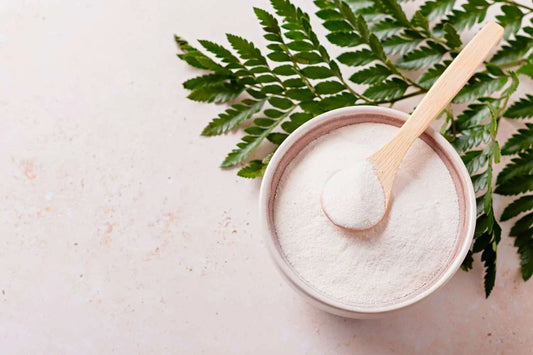Table of Contents
Resveratrol powder is gaining attention for its potential health perks, but what exactly makes it so popular?
Found naturally in red wine, grapes, and some berries, resveratrol is a compound that’s been studied for its possible role in supporting healthy aging, heart health, and more.
The powdered form offers a convenient way to explore these benefits without the need to consume vast amounts of food or drink.
But before you decide if it’s right for you, let’s take a closer look at what resveratrol powder is all about.
NMN + Resveratrol
Cellular NAD+ booster with ultra‑pure NMN and Resveratrol, at research‑backed doses.*
What is Resveratrol?-v1737064325801.webp)
-v1737064325801.webp)
Resveratrol is a natural compound found in plants like grapes, berries, and peanuts. It’s part of a group of compounds called polyphenols, which are known for their antioxidant properties.Plants produce resveratrol as a defense mechanism against environmental stressors like fungi, UV light, and injury.
For humans, it’s thought to work similarly by helping to neutralize harmful free radicals in the body, which can contribute to aging and chronic diseases.
You may have heard of resveratrol in connection with red wine—it’s one of the reasons wine is often associated with heart health.
While red wine does contain small amounts of resveratrol, you’d need to drink far more than is healthy to get the benefits.
That’s where supplements come in, offering a concentrated dose of this fascinating compound.
What Is Resveratrol Powder?
 Resveratrol powder is a concentrated supplement derived from natural sources like Japanese knotweed or grapes, offering a potent and convenient way to consume resveratrol.
Resveratrol powder is a concentrated supplement derived from natural sources like Japanese knotweed or grapes, offering a potent and convenient way to consume resveratrol.
Unlike the resveratrol found in food, both the powdered and capsule forms are designed to deliver higher levels of trans-resveratrol, the most active and widely studied type.
Japanese knotweed is a particularly common source because it’s rich in this compound and relatively easy to cultivate.
Resveratrol powder is often favored over capsules or tablets for its versatility. You can mix it into water, smoothies, or other beverages, making it a flexible option for those who prefer not to swallow pills. Plus, its shelf stability makes it easy to store and use regularly.
Potential Health Benefits of Resveratrol
Resveratrol powder has been studied for a wide range of health benefits, though it’s worth noting that much of the research comes from animal studies or small lab experiments. Human studies are ongoing, and while the findings are promising, they’re not definitive yet.
Here’s a closer look at what resveratrol might help with:
Cardiovascular Health: Research suggests resveratrol could help manage blood pressure and cholesterol levels. In studies on people with hypertension, it’s shown potential to improve both systolic and diastolic blood pressure (1).
Brain Function: Early findings indicate resveratrol may protect cognitive function, potentially lowering the risk of neurodegenerative diseases like Alzheimer’s and Parkinson’s (2).
Metabolic Health: It may support better blood sugar control and insulin sensitivity, which could reduce the risk of type 2 diabetes. A 2022 meta-analysis highlighted its potential to improve glucose and lipid metabolism (3).
Weight Management: In studies involving individuals with metabolic syndrome, resveratrol supplementation (500 mg daily for 12 weeks) was linked to reductions in body weight and waist circumference (4).
Joint Health: Research hints that resveratrol might ease symptoms of osteoarthritis and rheumatoid arthritis, especially when paired with other treatments (5).
Healthy Aging: Research using animal models suggests that the antioxidant effects of resveratrol may promote longevity and reduce age-related diseases. While these findings are encouraging, more human studies are needed to confirm how resveratrol impacts aging (6).
- Immune System Support: Low doses of resveratrol may support immune system function by boosting antioxidant activity and reducing inflammation. Its role in moderating immune responses shows potential, but further research is necessary to explore its full scope in human health (7).
NMN + Resveratrol
Cellular NAD+ booster with ultra‑pure NMN and Resveratrol, at research‑backed doses.*
How to Use Resveratrol Powder
Using resveratrol powder is straightforward and versatile, making it a convenient option for those looking to incorporate it into their daily routine. It can be mixed into beverages or added to meals for flexibility.
Mix it with water or juice: Add the recommended dose to a glass of water or your favorite juice for a quick and easy option.
Combine it with smoothies: Blend resveratrol powder into your morning smoothie to pair it with other healthy ingredients.
Pair it with fat-rich foods: Since resveratrol is fat-soluble, mixing it with yogurt, olive oil, or a fat-containing meal may enhance absorption.
Follow dosage instructions: Stick to the manufacturer’s recommended dose, typically measured in milligrams, to avoid overuse.
While timing doesn’t drastically affect its effectiveness, taking resveratrol powder with a meal or snack may help improve absorption. Whether you prefer mornings or evenings, consistency is key to seeing potential benefits.
Possible Side Effects and Precautions
Resveratrol is generally well-tolerated when taken at recommended doses, and many people use it without experiencing any side effects. That said, higher doses or individual sensitivities can lead to mild issues such as (8):
Nausea
Diarrhea
Vomiting
If you’re new to resveratrol, start with a lower dose and monitor how your body responds before increasing it gradually.
While resveratrol supplements are safe for most people, certain groups should avoid them due to potential interactions or risks. These include:
Individuals with metabolic dysfunction-associated liver disease: Resveratrol has been linked to liver dysfunction in some cases.
People with bleeding disorders: Resveratrol may increase the risk of bruising and bleeding.
Those with hormone-sensitive conditions: Resveratrol might mimic estrogen in the body, which can worsen conditions like uterine fibroids or breast cancer.
Pregnant or breastfeeding women: There’s limited research on resveratrol supplementation during these periods, so it’s best to avoid it unless recommended by a healthcare provider.
As always, consult your doctor before starting any new supplement, especially if you have underlying conditions or are taking medications.
Resveratrol Powder vs. Capsules: Which Is Better?
-v1737332425108.webp) Capsules are often considered more convenient than resveratrol powder, offering pre-measured doses, better portability, and less hassle for those on the go.
Capsules are often considered more convenient than resveratrol powder, offering pre-measured doses, better portability, and less hassle for those on the go.
Resveratrol capsules save time and effort by eliminating the need to measure each dose, making them a practical choice for busy lifestyles. They also tend to have a longer shelf life and are easy to carry when traveling.
On the other hand, resveratrol powder provides more flexibility in dosing and can be incorporated into foods or drinks, which some people find appealing.
If you’re looking for a top-tier option, Omre NMN + Resveratrol capsules combine premium quality with convenience.
This supplement includes ultra-pure ingredients: 500 mg of NMN and Resveratrol per serving, along with BioPerine® for enhanced absorption.
It’s manufactured without fillers, ensuring you get exactly what you pay for. The capsules align with research-backed dosages and use high-purity trans-resveratrol, ensuring optimal efficacy.
Whether you’re focused on supporting cellular health or aging gracefully, these capsules are a reliable choice.
They’re also easy to integrate into a morning routine with a fat-rich meal, helping your body absorb resveratrol more effectively.
Conclusion
Resveratrol powder offers a flexible and convenient way to explore the potential benefits of this fascinating compound.
From supporting heart and brain health to promoting healthy aging and possibly aiding joint and metabolic wellness, resveratrol has been studied for its versatility and promise.
While much of the research is still ongoing, its antioxidant properties make it a popular addition to health routines. Whether you prefer powder or capsules, choosing a high-quality product is key.
If you’re considering adding resveratrol to your routine, Omre NMN + Resveratrol is an excellent choice, offering 500 mg of ultra-pure ingredients in every serving.
For more details, check availability.
FAQs
What is the recommended dosage of resveratrol powder?
The dosage can vary, but most research suggests 250–500 mg per day is effective for general health. Always follow the instructions provided by the supplement manufacturer.
Can resveratrol powder be taken on an empty stomach?
Yes, but it’s better absorbed when taken with fat-rich foods like yogurt or olive oil since resveratrol is fat-soluble.
Are there any side effects of resveratrol powder?
Most people tolerate resveratrol well, but higher doses over 1000mg may cause nausea, diarrhea, or mild stomach discomfort.
How long does it take to see results from resveratrol supplementation?
The timeline varies depending on the individual and the health benefits you’re targeting. Some people notice changes in energy or well-being within a few weeks.
Is resveratrol safe for long-term use?
Resveratrol is generally safe for long-term use at recommended doses. However, consult a healthcare provider if you have underlying conditions or take medications that might interact with it.






-v1737059240475.webp)